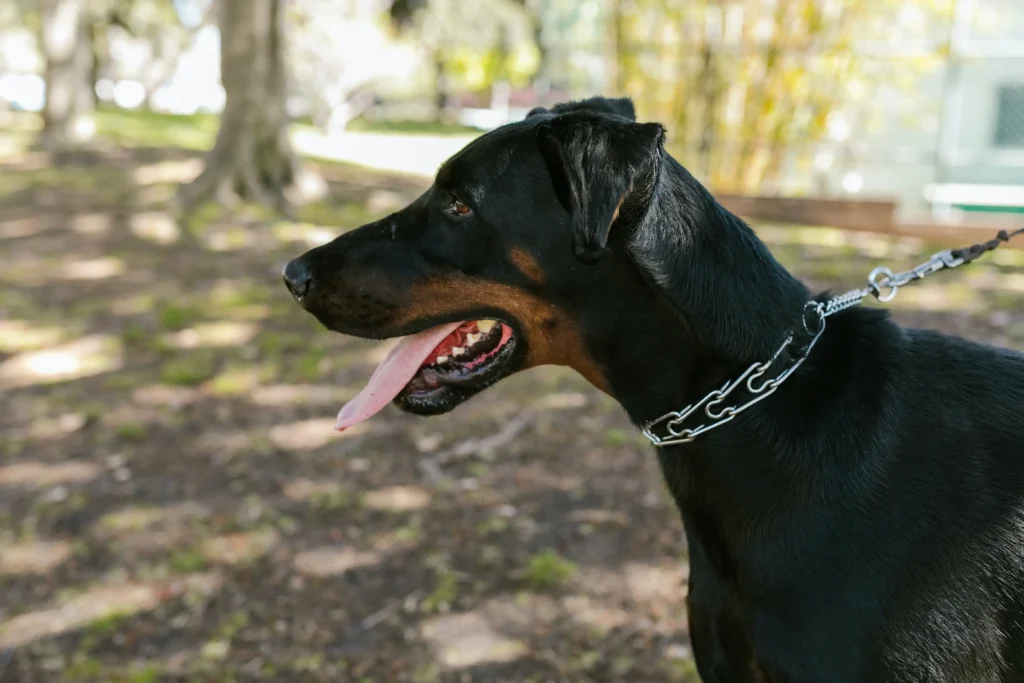The Doberman is known for being a formidable guard dog. Still, you wouldn’t normally see Dobermans as service dogs, which begs the question: Can a Doberman be a Service Dog?
Table of Contents
ToggleThe Doberman Pinscher is a working dog breed, which means it has the necessary traits to make an excellent service dog. It has great stature and a strong build. It’s also loyal, protective, intelligent, trainable, and hyper-focused on its owner.
So, if you’re thinking about getting a Doberman service dog, read on to learn more about this amazing breed’s temperament.
Can a Doberman be a Service Dog?
While uncommon, Dobermans can make amazing service dogs. They’re a working dog breed, which means they’re:
- Highly intelligent
- Loyal
- Trainable
- Strong
- Hyper-focused
- Alert
- Eager to please
- Affectionate
All of these traits are essential for a service dog. Not to mention that Dobermans rarely need special training to be protective of or eager to help their owners.
In addition, when you combine those traits with this breed’s protective and gentle nature, a Doberman can make an excellent emotional support animal (ESA) and psychiatric service dog (PSD).
In fact, Dobermans are known as “velcro” dogs as they tend to stick close to their owners at all times, following them from room to room. They can also detect seizures and gently intervene in cases of self-injury.
Are European Dobermans Good Service Dogs?

The European Doberman, with its thicker bone structure, can seem more menacing than the American Doberman.
However, given that there are minor temperament differences between the two Doberman varieties, European Dobies can make good service dogs. They have excellent working-dog temperament, but they’re also assertive and confident in unfamiliar situations.
That said, European Dobermans require more exercise due to their high stamina and drive, so they may be better suited for mobility service dogs.
What’s more, they prefer a firm and clear training approach, unlike American Dobermans, who fare better under a softer approach with frequent positive reinforcement.
Are Dobermans Good for Anxiety?
Dobermans can be good for people with anxiety for several reasons.
To begin with, Dobermans need regular exercise, which is an effective method of relieving anxiety.
What’s more, when it comes to grooming, these Dobies are low maintenance. So there’ll be no need for those anxiety-inducing trips to the groomer.
Not to mention that, while Dobermans have a high prey drive, they can appear to have almost no prey drive with proper socialization and training. That means they’re less likely to bark for no apparent reason or take off running after a small animal.
Luckily, Dobermans are highly trainable, with the ability to learn quickly, retain commands, and please their owners. These qualities are essential for dog breeds that are good for people with anxiety.
Will a Doberman Protect You Without Training?
While it may vary from dog to dog, most untrained Dobermans will instinctively protect their owners from any perceived danger.
Dobermans were bred specifically to protect their handlers. As a result, they have instinctive traits that provide them with a natural drive to defend their owners against any threat.
These traits include suspicion of strangers, being in tune with their owners, loyalty, and a strong desire to stay close to their owners.
That’s why, even without training, Dobermans are often observed exhibiting natural protective behaviors such as:
- Staying close to their owners in new surroundings
- Sleeping facing the door
- Frequently checking in with their owners
- Becoming aggressive when their owners become tense
Are Dobermans Known to Be Aggressive?

Because Dobermans were once commonly used as guard and police dogs, they’re stereotyped as aggressive, intimidating, and vicious.
However, Dobermans are more protective than they are aggressive. Their natural instinct is to protect, so they won’t hesitate to defend their family and territory from any potential threat.
Still, they’ll only resort to aggression when necessary. Otherwise, Dobermans won’t bite or attack when in danger. Instead, they’ll stand upright in front of their owners and bark to ward off the threat.
Dobermans are also not aggressive toward other dogs and animals, especially if they were raised with them. However, due to their protective nature, if a dog or animal outside poses a threat to their loved ones, they may become aggressive.
So, unless threatened, Dobermans are unlikely to seek out or cause trouble.
If you’ve met or heard of an aggressive Doberman, know that this behavior is likely due to the dog’s environment or training.
Why Are Dobermans not Police Dogs?

Although Dobermans were once popular police dogs with a rich military history, they’re now less common than police dogs for several reasons.
To begin with, Dobermans are highly intelligent and analytical, which is a positive trait in most cases. However, this breed’s intelligence provides them with a degree of independence.
So, following orders isn’t a strong suit for Dobermans, which is critical in situations where every second counts.
That’s one reason why training a Doberman requires far more time and money than training other dog breeds of similar strength and intelligence.
Another reason why Dobermans may not make good police dogs is that they form strong attachments to a single person.
As a result, if a Doberman’s officer passes away while on duty, the Doberman will without a doubt become anxious and depressed. This will also make it almost impossible to transfer the Doberman to another officer.
Is a Doberman More Protective than a German Shepherd?

Both Dobermans and German Shepherds are fiercely protective guard dogs. Nonetheless, Dobermans have a more innate protective instinct.
Dobermans were bred to be protective guard dogs, and those genetic traits are still present today. A Doberman will protect any person or animal it perceives as a member of its pack at all costs.
German Shepherds, on the other hand, are descendants of herding breeds. As obedient as this breed is, how protective a German Shepherd depends on the dog’s personality, the way it was raised, and the strength of its bond to its owner.
That said, both breeds have a tendency to be loyal and territorial, so they’ll go to great lengths to protect their family and home.
FAQ:
Can Dobermans be military dogs?
Yes, Dobermans have previously been used as military dogs.
They were one of the five preferred breeds of American military forces during WWII, along with German Shepherds, Belgian Sheepdogs, Collies, and Giant Schnauzers. They are well-known for their protection and guarding abilities, making them an excellent military dog breed.
Are Doberman dogs working dogs?
Doberman Pinschers are indeed working dogs. They were bred for police and military work and can perform all of the typical tasks expected of a service dog. They require a lot of exercise and enjoy having a job.
Can a Doberman be a seizure alert dog?
Yes, a Doberman Pinscher can be trained to alert people to seizures. They are intelligent and eager to help, which makes them ideal for service roles. While they cannot predict impending seizures, they can be trained to respond to them.
Is Doberman a low maintenance dog?
Doberman Pinschers are considered a low-maintenance breed, requiring little grooming and being described as “wash and wear” by the American Kennel Club. They do require a lot of exercise and solid training as puppies, but are otherwise relatively easy to care for in terms of grooming.
Will a Doberman naturally protect you?
Yes, a Doberman can protect its owner from harm. An untrained Doberman, on the other hand, may not act to engage an attacker, so professional training is recommended for the best protection.
Are Dobermans good PTSD service dogs?
Dobermans are excellent PTSD service dogs. They are intelligent and eager to assist, and they form close bonds with their handler. Dobermans can provide stability, anxiety relief, and seizure assistance. They also enjoy mental challenges and assisting their handler.
Are Dobermans good service dogs for anxiety?
Dobermans make good psychiatric service dogs because of their eagerness to please, awareness of their surroundings, and protective nature. They can gently intervene in cases of self-injury and help with stability, anxiety, and PTSD.
Are Dobermans the toughest dogs?
Due to their tough nature, Dobermans are frequently regarded as one of the strongest dog breeds. They are known for their alertness, intelligence, and strength, and have a powerful bite with an estimated pressure of 600 pounds. They may be intimidating and aggressive, but they are not the toughest dogs.
Why are Dobermans so special?
Doberman Pinschers are a highly adaptable breed that are used for search and rescue, therapy, and other forms of service. They are also devoted to their families and, if properly socialized and trained, can be very sweet and affectionate with children. Dobermans were bred to have the fearlessness required to fight for extended periods of time without regard for self-preservation. They do, however, require extensive exposure to friendly people in order to avoid becoming overly protective of their family.
In Conclusion
Being fiercely protective comes naturally to Dobermans. They’re also highly intelligent, loyal, determined, and driven. All of these traits explain why Dobermans are great at protecting their families and excel in roles that make use of their instinctive nature.
So, if you’re looking for unparalleled loyalty, intelligence, and dependability, you should highly consider getting a Doberman service dog.
If you liked this blog article about the question: Can a Doberman be a Service Dog, don’t forget to leave us a comment down below to tell us about your experience with a Doberman.








